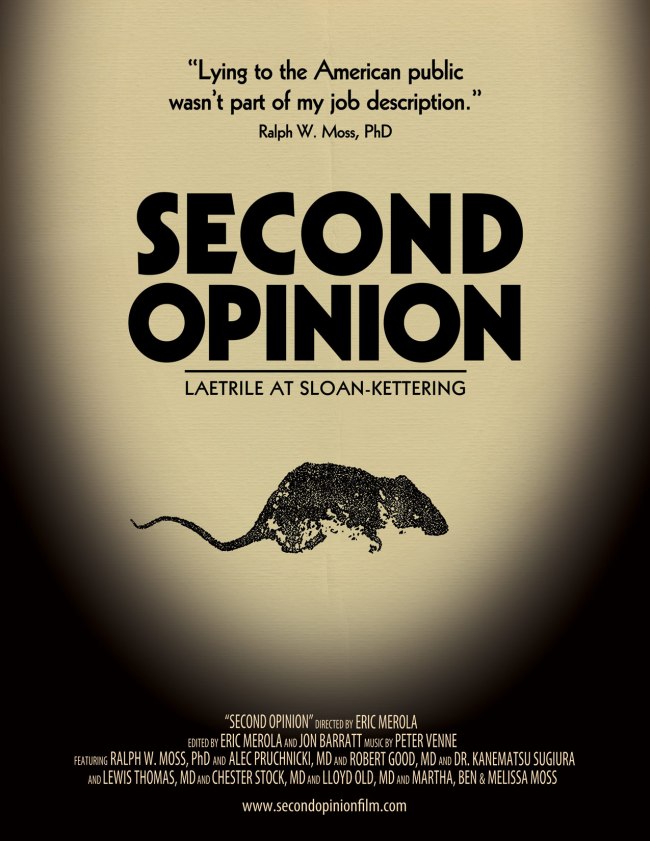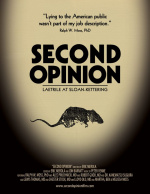Second Opinion: Laetrile At Sloan-Kettering
Though a documentary, it's dramatic enough to be reminiscent of "The Insider," the whistleblowing thriller about Big Tobacco.
Second Opinion: Laetrile At Sloan-Kettering
“Ralph W. Moss has stayed the course in stating his case. I am glad his voice is being heard.” ~ Harold P. Freeman, MD, Past National President, American Cancer Society and Past Chairman, President’s Cancer Panel
The War On Cancer, launched in the early 1970s, set the stage for a massive influx of new ideas in fighting the disease of cancer. Memorial Sloan-Kettering Cancer Center, America's leading cancer research center at the time, was assigned the task of testing an unconventional therapy called “Laetrile” in an effort to curb the public’s “false hope” in the alleged “quack” therapy.
Ralph W. Moss PhD, a young and eager science writer, was hired by Sloan-Kettering’s public relations department in 1974 to help brief the American public on the center’s contribution to the War On Cancer. One of his first assignments was to write a biography about Dr. Kanematsu Sugiura, one of the Center’s oldest and leading research scientists as well as the original co-inventor of chemotherapy.
While meeting with this iconic scientist to pen a biography on his 60-year career at Sloan-Kettering, Moss discovered that Sugiura had been studying this “quack remedy”in laboratory mice, and with unexpectedly positive results. Shocked and bewildered, Moss reported back to his superiors what he had discovered, only to be met with backlash and denial from Sloan-Kettering’s leaders on what their own leading scientist had found.
Fueled by respect and admiration for Sugiura—Ralph W. Moss attempted to publicize the truth about Sugiura’s findings. And after all diplomatic approaches failed, Moss lived a double life, working as a loyal employee at Sloan-Kettering while also recruiting fellow employees to help anonymously leak this information to the American public— through a newly formed underground organization they called—“Second Opinion”.
The War On Cancer, launched in the early 1970s, set the stage for a massive influx of new ideas in fighting the disease of cancer. Memorial Sloan-Kettering Cancer Center, America's leading cancer research center at the time, was assigned the task of testing an unconventional therapy called “Laetrile” in an effort to curb the public’s “false hope” in the alleged “quack” therapy.
Ralph W. Moss PhD, a young and eager science writer, was hired by Sloan-Kettering’s public relations department in 1974 to help brief the American public on the center’s contribution to the War On Cancer. One of his first assignments was to write a biography about Dr. Kanematsu Sugiura, one of the Center’s oldest and leading research scientists as well as the original co-inventor of chemotherapy.
While meeting with this iconic scientist to pen a biography on his 60-year career at Sloan-Kettering, Moss discovered that Sugiura had been studying this “quack remedy”in laboratory mice, and with unexpectedly positive results. Shocked and bewildered, Moss reported back to his superiors what he had discovered, only to be met with backlash and denial from Sloan-Kettering’s leaders on what their own leading scientist had found.
Fueled by respect and admiration for Sugiura—Ralph W. Moss attempted to publicize the truth about Sugiura’s findings. And after all diplomatic approaches failed, Moss lived a double life, working as a loyal employee at Sloan-Kettering while also recruiting fellow employees to help anonymously leak this information to the American public— through a newly formed underground organization they called—“Second Opinion”.
Genre
Documentary,
Bio-pic,
Drama
Web Site
Runtime
75
Language
English
Director
Eric Merola
FEATURED REVIEW
Anita Gates, New York Times
When your public relations guy starts describing you as diabolical, there’s a problem. Ralph W. Moss, the center of Eric Merola’s documentary “Second Opinion: Laetrile at Sloan-Kettering,” was that guy, working in Memorial Sloan-Kettering Cancer Center’s public affairs department in the 1970s. He ...
Played at
Lumiere Music Hall 9.05.14 - 9.11.14
Second Opinion: Laetrile At Sloan-Kettering Get Tickets
There are currently no showtimes for this film. Please check back soon.

